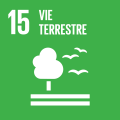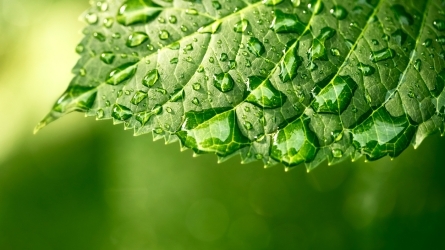
Los árboles y el agua
The basis for a better understanding of the evolution of forests (and their management) due to water scarcity.
Description
Water is the protagonist of both hydrological processes (precipitation, interception, evaporation, etc.) and many other fundamental processes: biological (such as photosynthesis), climatic (such as droughts and fires) or soilwise (such as erosion). Furthermore, most of the effects that climate change is having on forests are directly related to hydrological imbalances. Consequently, in order to get to know the state of natural systems and their functioning, it is necessary to analyse the behaviour and relationship of ecosystems in all their processes in relation to this element: water.
In the specific case of forests, carrying out such an analysis involves analysing the arrival, distribution and departure of water in forests; seeing where it is at any given time and how it is used. This means analysing the water involved in the surrounding atmosphere, in the plants that absorb and transpire it, and in the soil that stores and carries it.
Knowing this relationship provides an important information to glimpse the current status of each potential forest and the future possibilities for its evolution:
- The impacts of climate alterations on forests and forest ecosystems: although climate change is unquestionable, its effects on forests are much more diffuse, indirect and unpredictable, and monitoring allows us to detect early symptoms of stress or decline.
- A precise quantification of the state of provision and regulation of key ecosystem services that underpin more dependent ecosystem services (carbon sequestration, growth, baseflow and groundwater supply, water retention and associated wildfire risk, decay and loss of vigour due to water stress, etc.).
- A solid basis on which to justify and base actions to adapt or mitigate our forests to climate change, or improve their resilience.
An increasing number of projects are being carried out to study the relationship between trees and water. It is a subject which creates concern and expectation, also in the Basque Country. For this reason, this course is going to take a closer look at some of them, especially those that focus on tree species typical of the current forests of the Basque Country.
Objectives
Analyse the relationship between forest trees and water: understand how it works and what the key points are.
Detect the problems that climate change, with an increase in droughts and heat waves, may generate in this relationship.
Present current projects where this relationship has been analysed for important tree species in the current forests of the Basque Country.
Activity directed to
- All public
- University student
- Students not from university
- Teachers
- Professionals
- Forest owners and managers; Research and development centres
Methodology
Two days of basic-level presentations and debates. The first day will be devoted to analysing general concepts related to trees and their use of water, and the second day will focus on specific case studies in this field relating to tree species that are important for the Basque Country.
Three national speakers on the first day, with a question and answer session after each presentation (45 minutes for the presentation and 15 minutes for questions) and a final round table discussion to explore the topic in greater depth through dialogue with and between the speakers. On the second day, there will be four international speakers, with presentations in different languages but translated into Spanish (45 minutes per presentation) and a final round table discussion where questions can be put to the speakers and the topic explored in greater depth through dialogue with and between the speakers.
In short, the aim is to analyse both the generic and the specific, based on scientific knowledge.
Program
14-07-2025
Registro
“Registro“Presentation by the Director of the activity
Inauguración institucional
- Pello Goikoetxea Urdapilleta | Basoa Fundazioa - Presidente
Presentación del curso
- Leire Salaberria Isasi | Unión de Selvicultores del Sur de Europa (USSE) - Directora gerente
Presentación del curso
- Aitor Onaindia Bereziartua | Basoa Fundazioa - Director técnico
“El uso del agua por los árboles“
¿Qué sabemos de su regulación a nivel global?
- Rafael Poyatos López | Universitat Autònoma de Barcelona (UAB) y CREAF - Profesor Agregado e investigador
“Los problemas de los bosques ante la sequía“
Procesos de decaimiento forestal asociados a la sequía
- Asier Herrero Méndez | Universidad del País Vasco (UPV/EHU) - Profesor Ayudante Doctor
Break
“La ecohidrología aplicada a la gestión forestal“
Cuantificación de los Servicios Ecosistémicos con herramienta de base ecohidrológica
- Javier Pérez Romero | Universitat Politècnica de València (UPV) Re-ForeST - Investigador-Estudiante Doctorado
Round table: “Los árboles, el agua y su gestión“
- Rafael Poyatos López | Universitat Autònoma de Barcelona (UAB) y CREAF - Profesor Agregado e investigador
- Asier Herrero Méndez | Universidad del País Vasco (UPV/EHU) - Profesor Ayudante Doctor
- Javier Pérez Romero | Universitat Politècnica de València (UPV) Re-ForeST - Investigador-Estudiante Doctorado
- Aitor Onaindia Bereziartua | Basoa Fundazioa - Director técnico
Synthesis
15-07-2025
“El haya ante la sequía“
Posibles consecuencias para la gestión integrada de los bosques
- Frank Krumm | Instituto Federal de Investigación Forestal, Nieve y Avalanchas (WSL) de Suiza - Investigador en dinámica forestal y gestión integrada de los bosques
“Los robles ante la sequía“
Adaptación a la sequía en el género Quercus: variaciones fenotípicas y genéticas de los rasgos hidráulicos
- Sylvain Delzon | INRAE y Universidad de Burdeos - Director de investigación
Break
“El pino silvestre ante la sequía“
Un pionero vulnerable
- Jesús Julio Camarero Martínez | Instituto Pirenaico de Ecología, CSIC - Profesor de Investigación del CSIC
“Los pinos radiata y carrasco ante la sequía“
Evaluación de respuestas a sequías extremas mediante técnicas espectrales y análisis ecohidrológico
- Laura Arnal Roig | Universitat Politècnica de València (UPV) - Escuela Técnica Superior de Ingeniería Agronómica y del Medio Natural ETSIAMN - Investigadora
Round table: “El mosaico forestal vasco ante la sequía“
- Frank Krumm | Instituto Federal de Investigación Forestal, Nieve y Avalanchas (WSL) de Suiza - Investigador en dinámica forestal y gestión integrada de los bosques
- Sylvain Delzon | INRAE y Universidad de Burdeos - Director de investigación
- Jesús Julio Camarero Martínez | Instituto Pirenaico de Ecología, CSIC - Profesor de Investigación del CSIC
- Laura Arnal Roig | Universitat Politècnica de València (UPV) - Escuela Técnica Superior de Ingeniería Agronómica y del Medio Natural ETSIAMN - Investigadora
- Leire Salaberria Isasi | Unión de Selvicultores del Sur de Europa (USSE) - Directora gerente
Synthesis
Directors
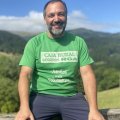
Aitor Onaindia Bereziartua
Basoa Fundazioa
Descended from a Basque family of baserritarras (farmers), he has been involved in the practice of agricultural, livestock and forestry management since he was a child. After several years studying and working as a forestry engineer in universities and organisations abroad (France and Chile), he has spent the last few years immersed in the development of sustainable forest management in the Basque Country. Since joining Basoa Fundazioa, now in his role as technical director, he has been disseminating both science and forest management and promoting and boosting the development of various projects aimed at innovating the Basque forestry sector and promoting and compensating for the multiple ecosystem services that forests offer society.
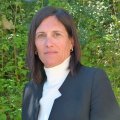
Leire Salaberria Isasi
Unión de Selvicultores del Sur de Europa (USSE)
Aunque de formación sea abogada mercantilista internacional, pertenece a una familia de tradición forestal, y desde el 2014, es la Directora-Gerente de la Unión de Selvicultores del Sur de Europa (USSE), organización internacional de propietarios forestales privados cuya actividad primordial es la de contribuir a la definición de la política forestal europea e internacional, mediante la toma de posición, representación y diálogo intersectorial, en foros internacionales relevantes aportando la perspectiva y demandas de los bosques del sur de Europa en los foros de decisión, —Unión Europea, FOREST EUROPE, Naciones Unidas, COFO-FAO— así como a través del dialogo y la cooperación con otras organizaciones del sector.
Speakers
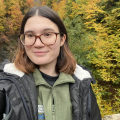
Laura Arnal Roig
Forest Engineer from the Polytechnic University of Valencia and currently pursuing postgraduate studies in Geomatics, Remote Sensing and Spatial Models Applied to Forest Management at the University of Córdoba. She is part of the Re-Forest group in the Department of Hydraulic Engineering and Environment at ETSIAMN (UPV), where she conducts applied research on sensorisation, forest modelling and ecosystem services. She is currently participating in the Interreg Sudoe SocialForest and GREEN BOOST projects of the Biodiversity Foundation, focused on promoting the resilience and adaptation of Mediterranean forests to climate change.
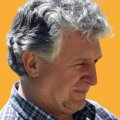
Jesús Julio Camarero Martínez
Research Professor at the Institute of Ecology and Evolutionary Biology (CSIC). His research is aimed at understanding the spatial and temporal patterns and the environmental mechanisms (global change) that control the dynamics (growth, regeneration, mortality) of trees and shrubs from a functional perspective. He has focused his work on understanding the effect of climate variability and changes in land use on processes as diverse as ecotone dynamics (altitudinal and latitudinal limits of the forest) and the effects of drought (decay) on the growth and vigour of forest species. To this end, he has used the study of wood anatomy and dendrochronology. His most recent studies focus on understanding how the components of global change (increased climate variability, droughts, changes in land use) determine processes of mass mortality and forest decline. The ultimate aim of his work is to understand how plant communities of woody species respond to intense disturbances within a broad temporal context defined by the great longevity of many of the species studied, as is the case with trees.
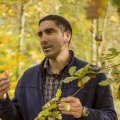
Sylvain Delzon
Sylvain Delzon is a Senior Researcher in Plant Evolutionary Ecology at INRAE - University of Bordeaux, France. He works at the crossroads of plant physiology, quantitative genetics and biogeography. His primary research interest is the understanding of plant ecophysiological responses to environment changes, with a particular emphasis on the mechanisms of drought resistance. He set up the high-throughput phenotyping platform, called CAVIPLACE at INRAE/University of Bordeaux thanks to an EquipEX national grant. This is currently the largest hydraulics platform in the world with a unique prototype developed in association with a local company specialized in industrial mechanics (3 standard cavitrons, one medium cavitron and one megacavitron for long-vesselled species; http://sylvain-delzon.com/caviplace/).

Pello Goikoetxea Urdapilleta
Basoa Fundazioa
Tolosarra has a degree in economics, business and banking. He is also a forest owner and President of Basoa Fundazioa. Although he is currently retired, he worked for 48 years in the financial sector, participating in the management of both branches and various departments at a corporate level. He started at the Caja de Ahorros y Monte de Piedad de Donostia and, after a stint at the Caja de Ahorros Kutxa Gipuzkoa, ended up at Banco Kutxabank SA. He has accumulated extensive experience in business management as a member of the Purchasing and Investment Committees, board member in the public housing companies of the Basque Government, in the hotel investment companies in which Kutxa has a stake and in several real estate development companies in which Kutxa has a stake. He has also been a member, CEO and President of the ‘Reyes de Aragón’ retirement home owned by Kutxa and a member of the Marketing, Purchasing and Investment committees of Torre Iberdrola, a subsidiary of Kutxabank. He also has experience in volunteering as a Trustee of the Sortek Foundation (business incubator) and President of Santo Tomás Lizeoa (Ikastola de Donostia).

Asier Herrero Méndez
Asier Herrero is an ecologist specialising in the response of forest ecosystems to climatic and biotic stresses. He is currently a doctoral assistant professor in the Department of Plant Biology and Ecology at the University of the Basque Country. His main line of research is the analysis of the vulnerability and resilience of forest ecosystems to disturbances and stress factors associated with climate change. The design and evaluation of management strategies and actions for the adaptation of forests to climate change and the study of the ecological mechanisms underlying species abundance patterns and their coexistence represent his secondary lines of research. His research adopts a multidisciplinary approach including the use of observational data, greenhouse experiments, literature reviews, historical archives of forest management, national forest inventories and ecological models. He has published 23 studies in international journals indexed in the Science Citation Index Expanded, resulting in an h-index of 15.

Frank Krumm
During his doctoral thesis and the years following his doctorate, he focused on subalpine fir forests, analyzing the impacts of land use change, natural disturbances, natural dynamics and the state and management of protection forests. Another central theme in his research, developed in the “InTree” project, has been to review the status of non-native species and their influence on forest ecosystems. The status, development and conservation potential of nature (biodiversity) in managed forests has become the main focus of the last 10 years of his professional career. Above all, he has focused on integrated forest management (how to integrate the different forest functions in forestry and, at the same time, promote biodiversity conservation). Finding and offering options and solutions for practical forest management is currently his main motivation. Current projects focus on the complete timber value chain, balancing CO2 emissions to reach net zero while maintaining other ecosystem services.

Aitor Onaindia Bereziartua
Basoa Fundazioa
Descended from a Basque family of baserritarras (farmers), he has been involved in the practice of agricultural, livestock and forestry management since he was a child. After several years studying and working as a forestry engineer in universities and organisations abroad (France and Chile), he has spent the last few years immersed in the development of sustainable forest management in the Basque Country. Since joining Basoa Fundazioa, now in his role as technical director, he has been disseminating both science and forest management and promoting and boosting the development of various projects aimed at innovating the Basque forestry sector and promoting and compensating for the multiple ecosystem services that forests offer society.
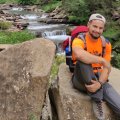
Javier Pérez Romero
Forest Engineer with a postgraduate degree in Geomatics, Remote Sensing and Spatial Models Applied to Forest Management from the University of Córdoba. Currently a PhD student in Bioscience and Agri-Food at the University of Córdoba. He is also a member of the Re-Forest group at the Department of Hydraulic Engineering and Environment at ETSIAMN (UPV), where he participates in various projects promoting green employment and forest bioeconomy (Murcia), hydrological and forest protection of reservoirs using hydrotechnology (Madrid), comprehensive measures to combat the impact of climate change in forest areas of the SUDOE region, and the development of a system for inventorying, monitoring and evaluating carbon and water additionality through forest management for PEFC Spain certification (PEFC +C +H2O) and adaptive management of Aleppo pine (LIFE ADAP-ALEPPO).
Rafael Poyatos López
He holds a degree in Environmental Sciences from the Autonomous University of Barcelona (2002) and a PhD in Biology from the University of Barcelona (2006), with a doctoral thesis carried out at the Jaume Almera Institute of Earth Sciences of the CSIC in Barcelona. He has been a postdoctoral researcher at Durham University, United Kingdom (2008-2009) and a visiting researcher at Ghent University, Belgium (2017) and at the Max Planck Institute for Biogeochemistry in Jena, Germany (2019-2023). Since 2009, he has been a researcher at the Centre for Ecological Research and Forestry Applications (CREAF) and, since 2023, he has been an Associate Professor at the Autonomous University of Barcelona. He is interested in understanding the regulation of water use by trees and how they respond to drought, based on ecophysiological measurements in various ecosystems (Mediterranean, Boreal, Tropical). He also coordinates the first global database on tree water use (SAPFLUXNET) and participates in various international research networks on forest ecophysiology.

Leire Salaberria Isasi
Unión de Selvicultores del Sur de Europa (USSE)
Aunque de formación sea abogada mercantilista internacional, pertenece a una familia de tradición forestal, y desde el 2014, es la Directora-Gerente de la Unión de Selvicultores del Sur de Europa (USSE), organización internacional de propietarios forestales privados cuya actividad primordial es la de contribuir a la definición de la política forestal europea e internacional, mediante la toma de posición, representación y diálogo intersectorial, en foros internacionales relevantes aportando la perspectiva y demandas de los bosques del sur de Europa en los foros de decisión, —Unión Europea, FOREST EUROPE, Naciones Unidas, COFO-FAO— así como a través del dialogo y la cooperación con otras organizaciones del sector.
Summary
Conclusions sent by the direction of the Summer Course
Sustainable development goals
Agenda 2030 is the new international development agenda approved in September 2015 by the United Nations. This agenda aims to be an instrument to favour sustainable human development all over the planet, and its main pillars are the eradication of poverty, a reduction in equality and vulnerability and fostering sustainability. It is a unique opportunity to transform the world up to 2030 and guarantee human rights for all.

3 - Good health and well-being
Guarantee a healthy life and foster the well-being of all people of all ages. Key issues: universal healthcare coverage, sexual and reproductive health, reduction in the number of road accident casualties, pollution and chemical products, reduction in maternal and neonatal mortality, the end of epidemics such as AIDS, combating hepatitis and other water-borne diseases, drug and alcohol prevention, control of tobacco.
More information
6 - Clean water and sanitation
Guaranteeing the availability and sustainable management of water and sanitation for everyone. Key issues: universal and fair access at an affordable price, access to sanitation and hygiene services, water quality, efficient use of water resources, end-to-end management, protection of water ecosystems, reduction of pollution, elimination of waste discharges, wastewater treatment.
More information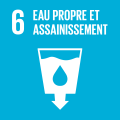
12 - Responsible consumption and production
Guarantee sustainable modalities of consumption and production. Key issues: sustainable management and efficient use of natural resources, reduction of chemical particles released to the atmosphere, water and soils, reduction of waste products, recycling, reuse and reduction, sustainable practices, sustainable public procurement, sustainable lifestyles, rationalisation of inefficient subsidies for fossil fuels.
More information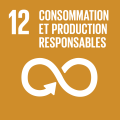
13 - Climate action
Adopt urgent measures to combat climate change and its effects. Key issues: mitigation, resilience and capacity for adaptation, planning, national strategies and plans, education and raising awareness, reduction of effects and early warning systems, compliance with the Framework Convention of the United Nations on Climate Change.
More information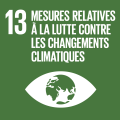
15 - Life on land
Protect, establish and foster the sustainable use of terrestrial ecosystems, manage forests sustainably, fight desertification, hold back and reverse the degradation of land and delay the loss of biodiversity. Key issues: the fight against desertification, reforestation, conservation, the regeneration and sustainable use of terrestrial ecosystems, natural habitats, biodiversity, invasive exotic species, integration of the values of ecosystems into planning, poaching.
More information